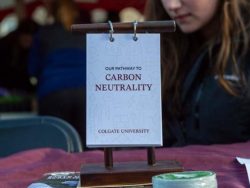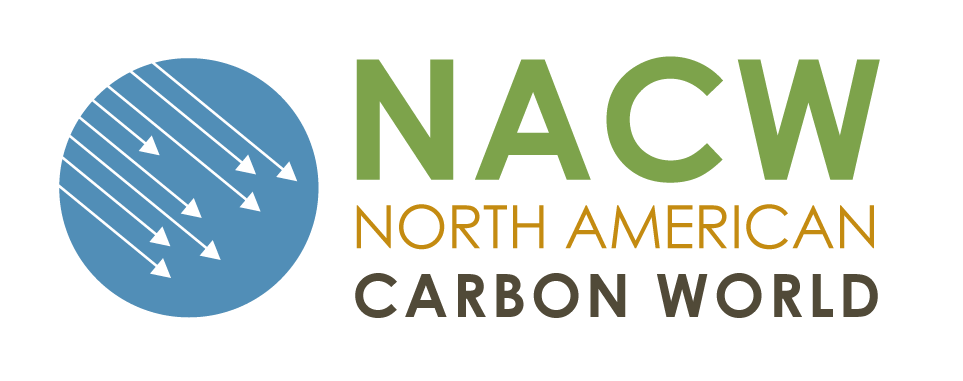Q&A with Colgate University, who recently retired offsets from the Reserve offset registry
 1. What is your organization’s mission?
1. What is your organization’s mission?
Colgate University is a private liberal arts college that was founded in 1819. Colgate’s mission is to provide a demanding, expansive, educational experience to a select group of diverse, talented, intellectually sophisticated students who are capable of challenging themselves, their peers, and their teachers in a setting that brings together living and learning. The purpose of the university is to develop wise, thoughtful, critical thinkers and perceptive leaders by challenging young men and women to fulfill their potential through residence in a community that values intellectual rigor and respects the complexity of human understanding.
2. What are the key principles and goals of your sustainability program?
 Colgate committed to carbon neutrality in 2008 and in April 2019 Colgate became the first institution of higher education in the State of New York to achieve carbon neutrality. Since its baseline carbon inventory in 2009, Colgate has reduced its campus carbon footprint by over 50 percent through on-campus projects and initiatives. Significant sources of emissions such as air travel, commuting, ground transportation, and some forms of energy use are currently impossible to eliminate without extraordinary cost or disruption to our academic mission. To achieve carbon neutrality, the University balanced its remaining on-campus carbon emissions by investing in off-campus carbon reduction projects (carbon offsets) so that its net carbon footprint is zero.
Colgate committed to carbon neutrality in 2008 and in April 2019 Colgate became the first institution of higher education in the State of New York to achieve carbon neutrality. Since its baseline carbon inventory in 2009, Colgate has reduced its campus carbon footprint by over 50 percent through on-campus projects and initiatives. Significant sources of emissions such as air travel, commuting, ground transportation, and some forms of energy use are currently impossible to eliminate without extraordinary cost or disruption to our academic mission. To achieve carbon neutrality, the University balanced its remaining on-campus carbon emissions by investing in off-campus carbon reduction projects (carbon offsets) so that its net carbon footprint is zero.
In addition to carbon neutrality, Colgate’s sustainability program features food and dining options that are sustainably and locally sourced; green building commitment with several buildings on campus that are LEED certified  and all new construction and major renovations required to achieve a minimum rating of LEED Silver; land and forest stewardship of Colgate’s 1,059 acres of forests that contain 210,058 tons of stored carbon and sequester an additional 3,884 tons of carbon annually; recycling and waste minimization, including decreasing paper usage, changing purchasing habits, determining alternatives to single-use items, and holding clothing swaps and donation drives; Green Revolving Loan Fund to support campus initiatives that measurably reduce the university’s carbon footprint and general ecological impact, such as lightbulb replacement; Sustainability Council that serves as an advisory committee to the University president about all aspects of sustainability on campus; and sustainable transportation options including campus bike rentals, free shuttle service, and electric vehicle charging stations.
and all new construction and major renovations required to achieve a minimum rating of LEED Silver; land and forest stewardship of Colgate’s 1,059 acres of forests that contain 210,058 tons of stored carbon and sequester an additional 3,884 tons of carbon annually; recycling and waste minimization, including decreasing paper usage, changing purchasing habits, determining alternatives to single-use items, and holding clothing swaps and donation drives; Green Revolving Loan Fund to support campus initiatives that measurably reduce the university’s carbon footprint and general ecological impact, such as lightbulb replacement; Sustainability Council that serves as an advisory committee to the University president about all aspects of sustainability on campus; and sustainable transportation options including campus bike rentals, free shuttle service, and electric vehicle charging stations.
3. How did you choose the right offset projects for your company?
The carbon offset project decisions are determined by student, staff, and faculty representatives after receiving feedback from groups and individuals on campus about the most important carbon offset factors to the Colgate community. The committee strives to balance the values most important to the community with the quality of the projects and the overall costs of investing in such initiatives.
Deciding on which carbon offsets to invest in involves an open and transparent process that involves extensive research along with opportunities for community feedback – including:
- researching the approaches from other leading institutions who have already achieved carbon neutrality and/or are already investing in carbon offsets;
- assessing the knowledge and opinions of students on the issue of carbon offsets at Colgate from students in Professor Ian Helfant’s Environmental Studies 390 course (spring 2018);
- an interactive brown bag discussion seminar for faculty and staff (spring 2018);
- a sensitivity analysis that evaluated the potential of the Colgate forest as a carbon offset project (summer 2018);
- researching institutional carbon offset decision-making processes at Colgate University and peer institutions conducted by students in Professor Andy Pattison’s Environmental Studies 390 course (fall 2018);
- a student led forum on the topic of carbon offsets (fall 2018);
- a presentation on carbon neutrality and carbon offsets at an all-faculty meeting (fall 2018);
- a campus-wide open forum on carbon neutrality and carbon offsets (fall 2018);
- an all-campus survey (fall 2018);
- two solicitations for bids from international, national, and New York State based carbon offset projects;
- a couple of interim reports that highlighted options and a summary of initial feedback;
- a couple dozen meetings of the Carbon Offsets Working Group to discuss their research, feedback from the community, and sharing of diverse perspectives.
General feedback from focus groups included:
- General agreement that buying domestic (U.S.) offsets is preferred over foreign offsets and local (NYS, Madison County, or Hamilton) is supported if the price is fair.
- Participants agreed that selecting a portfolio of project types is a good approach. Having a portfolio of projects also allows offsets to be evaluated, discussed, and critiqued by students and faculty which helps contribute to our knowledge and understanding of carbon offset markets.
- Some participants expressed concern for ensuring long-term permanence in forestry-based projects and thought that avoided deforestation could be problematic due to imposing values on other places/communities. Several participants expressed support for easily measurable offsets (e.g., methane destruction or recovery).
- General agreement that choosing local projects for their educational value alone is the least important criterion (e.g., learning can be achieved remotely and learning about projects does not necessarily involve site visits). However, one faculty member felt that educational value and supporting regional projects is the most important criteria.
Our offset retirements from the Reserve include the following:
| Supplier | Project Name | Methodology | Country | Vintage | Standard | SDGs Met | Offsets Purchased (tons) |
|---|---|---|---|---|---|---|---|
| ClimeCo | Ascend Performance Materials Operations LLC Adipic Acid N2O Abatement | N2O Abatement | Florida, USA | 2021-22 | CAR | 7 | 1,600 |
| NativeEnergy | May Ranch Avoided Conversion Project | Grasslands Preservation | Colorado, USA | 2017 and 2018 | CAR | 5 | 1,000 |
4. How has utilizing offsets benefited your organization / your clients / your community?
 Purchasing offsets has allowed the Colgate community to achieve carbon neutrality and support GHG reductions that provide SDGs and ecosystem benefits in the greater NY, US, and global community. Investing in offsets creates an opportunity for education and innovation. The process by which our university selects offset projects provides important learning and engagement opportunities for students, who learn about calculating carbon footprints, building robust carbon reduction strategies, developing thoughtful and responsible portfolios of emissions reduction projects, and the importance of engaging and listening to the input of the entire campus. Our students gain additional knowledge about the climate crisis, learn about local and important climate projects happening here and beyond, and can take the experience participating in achieving carbon neutrality to their next ventures.
Purchasing offsets has allowed the Colgate community to achieve carbon neutrality and support GHG reductions that provide SDGs and ecosystem benefits in the greater NY, US, and global community. Investing in offsets creates an opportunity for education and innovation. The process by which our university selects offset projects provides important learning and engagement opportunities for students, who learn about calculating carbon footprints, building robust carbon reduction strategies, developing thoughtful and responsible portfolios of emissions reduction projects, and the importance of engaging and listening to the input of the entire campus. Our students gain additional knowledge about the climate crisis, learn about local and important climate projects happening here and beyond, and can take the experience participating in achieving carbon neutrality to their next ventures.
Offsets also create a financial incentive to reduce on-campus emissions that would obviate the need to purchase future offsets on an annual and ongoing basis. While implementing on-campus projects that continue to reduce Colgate’s greenhouse gas emissions remains the top priority, the University must also choose among a myriad of carbon offsets options to maintain its carbon neutral status achieved in 2019.
 5. What’s next for your organization’s climate and environmental goals?
5. What’s next for your organization’s climate and environmental goals?
Colgate is super proud to have achieved carbon neutrality in 2019 and to have reduced its campus carbon footprint by over 60% from the 2009 baseline. Colgate continues to accept responsibility for its contribution to global climate change and is committed to finding further opportunities to reduce greenhouse gas emissions on campus and supporting further reductions of greenhouse gas emissions around the globe. We will continue to innovate and create sustainability initiatives on campus; invest in high-quality carbon offset projects that eliminate remaining emissions from Colgate’s operations; and educate and engage with our students to ensure they have the knowledge, tools, and resources to go forth and weave climate leadership into their chosen endeavors.






Comments are closed here.